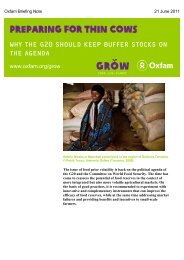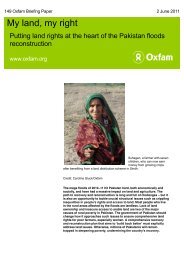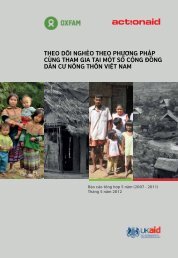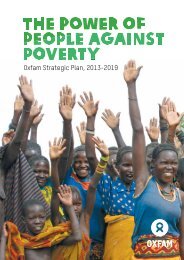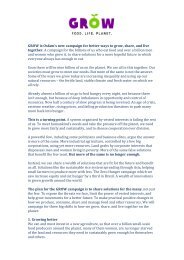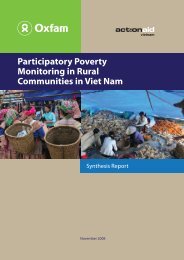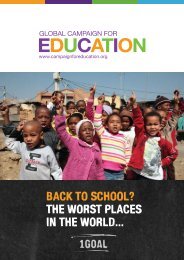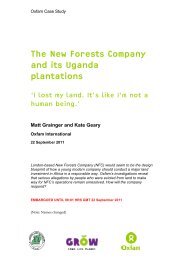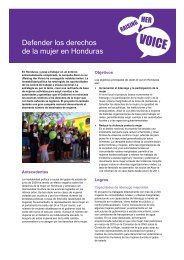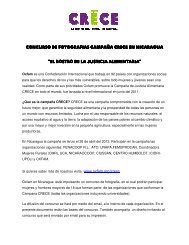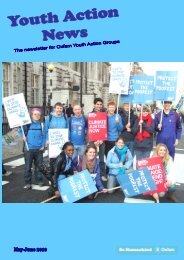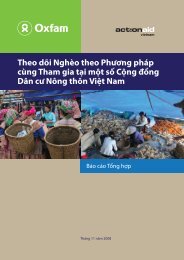Murika! Oxfam in Rwanda newsletter - Oxfam Blogs
Murika! Oxfam in Rwanda newsletter - Oxfam Blogs
Murika! Oxfam in Rwanda newsletter - Oxfam Blogs
You also want an ePaper? Increase the reach of your titles
YUMPU automatically turns print PDFs into web optimized ePapers that Google loves.
MURIKA!<br />
Welcome to the first edition of <strong>Murika</strong>!<br />
the <strong>Oxfam</strong> <strong>newsletter</strong> for <strong>Rwanda</strong>.<br />
<strong>Murika</strong> shares stories and updates about <strong>Oxfam</strong> and partners’ work <strong>in</strong> the country. This<br />
edition focuses on our <strong>in</strong>itiatives to support the creation of susta<strong>in</strong>able livelihoods for<br />
women and men, highlight<strong>in</strong>g some of our achievements over the past 6 months and<br />
shar<strong>in</strong>g plans for the next period.<br />
In early 2012 <strong>Rwanda</strong> registered impressive results <strong>in</strong> poverty reduction and aga<strong>in</strong>st<br />
some of the Millennium Development Goals. Here <strong>Oxfam</strong> shows its contribution to poverty<br />
reduction efforts, work<strong>in</strong>g with others to ensure that the poorest are benefitt<strong>in</strong>g from<br />
<strong>Rwanda</strong>’s economic growth, through creation of employment opportunities and better<br />
returns for small farmers.<br />
We thank all the contributors to the <strong>newsletter</strong> and welcome contributions to future<br />
editions. Please send ideas, comments and suggestions to kigali@oxfam.org.uk<br />
Women celebrate International Women’s Day 2012 <strong>in</strong> Nyabihu District. Photo: Gatete Thierry<br />
INSIDE<br />
Women entrpeneurs grow 2.3 million p<strong>in</strong>eapples<br />
16 days of activisim<br />
Evaluation of <strong>Oxfam</strong>’s market based livelihood programme<br />
Enterprise spotlight: a focus on Shek<strong>in</strong>a Enterprises
Godelive Nyirabakobua, a p<strong>in</strong>eapple sucker farmer, is supported<br />
through <strong>Oxfam</strong>’s programmes. Photo: Simon Rawles.<br />
Women entrepreneurs grow 2.2 million p<strong>in</strong>eapple<br />
suckers to boost <strong>Rwanda</strong>n p<strong>in</strong>eapple production<br />
Women entrepreneurs <strong>in</strong> Nyagatare and Muhanga districts have<br />
completed cultivation of 2.2 million p<strong>in</strong>eapple suckers (seeds)<br />
that will be used to boost the <strong>Rwanda</strong>n p<strong>in</strong>eapple <strong>in</strong>dustry<br />
with home-grown, better quality suckers. This is a fantastic<br />
achievement for women entrepreneurs supported by <strong>Oxfam</strong>.<br />
Two years ago, <strong>Oxfam</strong> established a market-based livelihoods<br />
programme with the aim of develop<strong>in</strong>g women’s economic<br />
leadership <strong>in</strong> horticultural value cha<strong>in</strong>s. The aim was to address<br />
gender <strong>in</strong>equalities <strong>in</strong> horticulture work by creat<strong>in</strong>g new roles for<br />
women beyond unpaid or poorly paid labour at production level,<br />
which also has low social status. <strong>Oxfam</strong> focused on develop<strong>in</strong>g<br />
women as economic leaders and entrepreneur suppliers of<br />
p<strong>in</strong>eapple and p<strong>in</strong>eapple plant<strong>in</strong>g material, as a source for<br />
susta<strong>in</strong>able <strong>in</strong>come <strong>in</strong> a fairly short period (18 to 24 months).<br />
Previously <strong>Rwanda</strong>n p<strong>in</strong>eapple growers were us<strong>in</strong>g suckers<br />
produced <strong>in</strong> neighbour<strong>in</strong>g Uganda, whose unstable quality<br />
affected the flower<strong>in</strong>g time and yield. With the <strong>in</strong>creas<strong>in</strong>g demand<br />
for <strong>in</strong>put supply on the one hand and the Government’s plan to<br />
<strong>in</strong>crease p<strong>in</strong>eapple cultivation on the other, <strong>Oxfam</strong> partnered with<br />
the Institute of Science and Agriculture <strong>in</strong> <strong>Rwanda</strong> (ISAR) who<br />
were also test<strong>in</strong>g a p<strong>in</strong>eapple seedl<strong>in</strong>g multiplication technique<br />
known as ‘macro-propagation’ . Work<strong>in</strong>g together <strong>Oxfam</strong> and ISAR<br />
converted the crop value cha<strong>in</strong> <strong>in</strong> to a bus<strong>in</strong>ess model as a way to<br />
createopportunities for women to develop skills, enterprises and<br />
recognition <strong>in</strong> the cha<strong>in</strong> as the ma<strong>in</strong> <strong>in</strong>put suppliers for p<strong>in</strong>eapple.<br />
THE BUSINESS MODEL IN A NUTSHELL<br />
There are three major stakeholders: a service provider – <strong>in</strong><br />
this case a women’s membership-based organisation, a<br />
micro f<strong>in</strong>ance <strong>in</strong>stitution (MFI) and the women entrepreneurs<br />
(p<strong>in</strong>eapple sucker producers). The service provider identifies<br />
women entrepreneurs and provides tra<strong>in</strong><strong>in</strong>g <strong>in</strong> p<strong>in</strong>eapple macro<br />
propagation techniques, then l<strong>in</strong>ks them as potential clients for<br />
p<strong>in</strong>eapple macro propagation to an MFI. Either the MFI provides<br />
loans to women/women solidarity groups or women use their own<br />
sav<strong>in</strong>gs to start the bus<strong>in</strong>ess. The women repay the money <strong>in</strong><br />
small <strong>in</strong>stalments <strong>in</strong>itially and pay off the entire loan through the<br />
sale of the suckers. Each cluster of 30-40 women entrepreneurs<br />
are supported by a women field facilitator who provides technical<br />
tra<strong>in</strong><strong>in</strong>gs, monitors the work and facilitates market l<strong>in</strong>kage<br />
development. A ‘women traders’ role is be<strong>in</strong>g explored as a more<br />
susta<strong>in</strong>able way of do<strong>in</strong>g bus<strong>in</strong>ess. Overall the model leads to<br />
<strong>in</strong>come realisation and enhanc<strong>in</strong>g a client base for MFIs, creat<strong>in</strong>g<br />
<strong>in</strong>come opportunities for women as suppliers and traders for <strong>in</strong><br />
local and prov<strong>in</strong>cial markets.<br />
BUSINESS MODEL: PINEAPPLE PLANTING MATERIAL: PRODUCTION AND SUPPLY<br />
Local sell<br />
Women<br />
traders<br />
Bus<strong>in</strong>ess relationship<br />
Facilitation role<br />
Income/market realization<br />
Reta<strong>in</strong><strong>in</strong>g<br />
clients<br />
MFI<br />
Interest<br />
on loan<br />
Credit support<br />
Engag<strong>in</strong>g women<br />
with MFI<br />
Women<br />
producers<br />
Capacity<br />
build<strong>in</strong>g<br />
Measure<br />
change<br />
Service<br />
Provider<br />
Women’s ecoleadership<br />
The programme has enabled women to produce a marketable<br />
product with m<strong>in</strong>imal resources <strong>in</strong>vestment. It has also changed<br />
their attitude from be<strong>in</strong>g dependant to seek<strong>in</strong>g creative and<br />
<strong>in</strong>novative solutions to their problems. There is a positive change<br />
<strong>in</strong> the way women <strong>in</strong>volved <strong>in</strong> this activity are be<strong>in</strong>g perceived <strong>in</strong><br />
their homes and communities. The approach is help<strong>in</strong>g to create a<br />
visible role for women <strong>in</strong> horticultural value cha<strong>in</strong>s as suppliers of<br />
plant<strong>in</strong>g material which is valued by many stakeholders. In many<br />
cases women are also hir<strong>in</strong>g labourers to support their enterprises.<br />
A recent evaluation has shown that 10,000 days of labour were<br />
bought by the participat<strong>in</strong>g women <strong>in</strong> the previous 6 months thus<br />
creat<strong>in</strong>g much needed employment opportunities. Poor women have<br />
also accessed Rwf 36 million (around $60,000) <strong>in</strong> loans to support<br />
this enterprise through the micro-f<strong>in</strong>ance partner. Work<strong>in</strong>g <strong>in</strong><br />
solidarity groups means that the women were able to access larger<br />
loans without traditional collateral requirements.<br />
The next phases for <strong>Oxfam</strong>’s work on plant<strong>in</strong>g material will be to<br />
scale up the models and engage with other MFIs who can promote<br />
this type of work; work<strong>in</strong>g with research <strong>in</strong>stitutions <strong>in</strong> develop<strong>in</strong>g<br />
technologies for water<strong>in</strong>g; and l<strong>in</strong>k<strong>in</strong>g the private sector with<br />
farmers. We will start a new project focus<strong>in</strong>g on tree tomato and<br />
passion fruit <strong>in</strong>put supply <strong>in</strong> 2012.<br />
Photo: Simon Rawles.<br />
Overall the model leads to <strong>in</strong>come realisation and enhanc<strong>in</strong>g a<br />
client base for MFIs, creat<strong>in</strong>g <strong>in</strong>come opportunities for women as<br />
suppliers and traders for <strong>in</strong> local and prov<strong>in</strong>cial markets.<br />
The programme has enabled women to produce a marketable<br />
product with m<strong>in</strong>imal resources <strong>in</strong>vestment. It has also changed<br />
their attitude from be<strong>in</strong>g dependant to seek<strong>in</strong>g creative and<br />
<strong>in</strong>novative solutions to their problems. There is a positive change<br />
<strong>in</strong> the way women <strong>in</strong>volved <strong>in</strong> this activity are be<strong>in</strong>g perceived <strong>in</strong><br />
their homes and communities. The approach is help<strong>in</strong>g to create a<br />
visible role for women <strong>in</strong> horticultural value cha<strong>in</strong>s as suppliers of<br />
plant<strong>in</strong>g material which is valued by many stakeholders. In many<br />
cases women are also hir<strong>in</strong>g labourers to support their enterprises.<br />
A recent evaluation has shown that 10,000 days of labour were<br />
bought by the participat<strong>in</strong>g women <strong>in</strong> the previous 6 months thus<br />
creat<strong>in</strong>g much needed employment opportunities. Poor women<br />
have also accessed Rwf 36 million (around $60,000) <strong>in</strong> loans to<br />
support this enterprise through the micro-f<strong>in</strong>ance partner. Work<strong>in</strong>g<br />
<strong>in</strong> solidarity groups means that the women were able to access<br />
larger loans without traditional collateral requirements.<br />
The next phases for <strong>Oxfam</strong>’s work on plant<strong>in</strong>g material will be to<br />
scale up the models and engage with other MFIs who can promote<br />
this type of work; work<strong>in</strong>g with research <strong>in</strong>stitutions <strong>in</strong> develop<strong>in</strong>g<br />
technologies for water<strong>in</strong>g; and l<strong>in</strong>k<strong>in</strong>g the private sector with<br />
farmers. We will start a new project focus<strong>in</strong>g on tree tomato and<br />
passion fruit <strong>in</strong>put supply <strong>in</strong> 2012.<br />
PINEAPPLE SUCKERS ON THE AIRWAVES<br />
Mr. Kagiraneza Boniface, a researcher/technician from <strong>Rwanda</strong><br />
Agriculture Board (RAB - formerly known as ISAR), visited women<br />
p<strong>in</strong>eapple suckers producers <strong>in</strong> Nyagatare on 6th-7th February<br />
2012. To raise awareness about the macro propagated p<strong>in</strong>eapple<br />
seedl<strong>in</strong>gs, a one hour radio programme was aired on Radiyo<br />
y’Abaturage ya Nyagatare, hosted by Lambert Nkund<strong>in</strong>eza.<br />
For the event, Boniface was accompanied by two staff of<br />
Duterimbere ASBL, a cooperative be<strong>in</strong>g supported by <strong>Oxfam</strong> to<br />
provide technical support to the women entrepreneurs. Dur<strong>in</strong>g the<br />
radio programme, the guests expla<strong>in</strong>ed the seedl<strong>in</strong>g multiplication<br />
technique and its advantages. They also provided advice to exist<strong>in</strong>g<br />
producers on how to better take care of nurseries, especially <strong>in</strong><br />
areas prone to long spells of dry season such as Nyagatare.<br />
Boniface urged farmers to use properly developed macro<br />
propagated suckers to develop better quality p<strong>in</strong>eapple orchards,<br />
<strong>in</strong>stead of crowns from exist<strong>in</strong>g plants received from the<br />
process<strong>in</strong>g units thrown as wastage. More than 10 people from<br />
Gatsibo and Muhanga called <strong>in</strong> to the programme to get more<br />
<strong>in</strong>formation and show<strong>in</strong>g <strong>in</strong>terest <strong>in</strong> purchas<strong>in</strong>g quantities of<br />
suckers. <strong>Oxfam</strong> and Duterimbere are now plann<strong>in</strong>g to broadcast<br />
this radio programme <strong>in</strong> Nyagatare and Muhanga districts.<br />
MEET THE WOMEN ENTREPRENEURS<br />
Uwamwezi Merciana, 41, p<strong>in</strong>eapple cultivator, p<strong>in</strong>eapple seed<br />
plant farmer and imboni (community facilitator)<br />
Merciana is a farmer <strong>in</strong> Ntoma Sector, Nyagatare District, where<br />
she lives with her husband and their three children. Merciana was<br />
first tra<strong>in</strong>ed <strong>in</strong> seed multiplication techniques <strong>in</strong> 2010 by <strong>Oxfam</strong><br />
partner Duterimbere ASBL, who then selected her as a community<br />
facilitator, after notic<strong>in</strong>g her keen <strong>in</strong>terest <strong>in</strong> the activity and good<br />
communications skills. Today she has tra<strong>in</strong>ed more than 40 women<br />
to develop small p<strong>in</strong>eapple nurseries. Later, with imported plant<strong>in</strong>g<br />
material from Uganda, Merciana used <strong>in</strong>novative ways to multiply<br />
seedl<strong>in</strong>gs. Today, she owns a nursery of more than 80,000 seedl<strong>in</strong>gs,<br />
of which she has sold more than 40,000. “I have been recognised as<br />
knowledgeable <strong>in</strong> this technique because even agronomists from<br />
Bugasera and Gitarama travel to Nyagatare to learn from me.” In<br />
her district of Nyagatare, she was chosen by her peers to chair the<br />
association of p<strong>in</strong>eapple growers and seed plant farmers.<br />
Merciana’s husband has also shown great trust <strong>in</strong> her leadership<br />
abilities. “In my family my husband sees me as an equal contributor<br />
and can’t take any decision without consult<strong>in</strong>g me.” Accord<strong>in</strong>g to<br />
Merciana he was <strong>in</strong>itially sceptical about her bus<strong>in</strong>ess but now he<br />
has agreed to shift their home closer to the small farm where she<br />
could better attend to her nursery.<br />
Uwamwezi Merciana. Photo: Simon Rawles.
MUKAMANA ANNONCIATA, 26, SINGLE MOTHER AND<br />
PINEAPPLE SEED PLANT FARMER<br />
Annonciata lives <strong>in</strong> Katabagemu Sector, Nyagatare District located<br />
<strong>in</strong> the Eastern Prov<strong>in</strong>ce of <strong>Rwanda</strong>. She is a s<strong>in</strong>gle mother and lives<br />
with her three children aged 8, 6 and 1,5 years, along with her mother<br />
and younger sister. She is a farmer but does not own land. Through<br />
cultivat<strong>in</strong>g a high value horticultural crop on rented land, Annonciata<br />
has been able to pay for land lease and susta<strong>in</strong> her family.<br />
Annonciata has been part of <strong>Oxfam</strong>’s plant<strong>in</strong>g material project<br />
for two years and was tra<strong>in</strong>ed <strong>in</strong> the technique of multiply<strong>in</strong>g<br />
p<strong>in</strong>eapple seed plants (macro propagation) by <strong>Oxfam</strong> and its<br />
partner Duterimbere ABSL. After jo<strong>in</strong><strong>in</strong>g a solidarity group (an<br />
<strong>in</strong>formal social group of 3-5 people who come together to take a<br />
loan and get solidarity collateral), she now owns two goats and is<br />
able to look after the basic needs of her family such as medical<br />
<strong>in</strong>surance and food and clothes for herself, her mother and her<br />
children. She <strong>in</strong>vested about Rwf 63,000 (approx. GBP 63) <strong>in</strong>to the<br />
activity and got an <strong>in</strong>come of Rwf 200,000 from sell<strong>in</strong>g her seeds.<br />
She used the money to buy a goat, which gave birth to two kids,<br />
and then sold it and kept the kids. “Be<strong>in</strong>g able to buy the goats has<br />
been my biggest achievement. It has given me an activity to do<br />
even though I don’t have land.....I benefited a lot from this project<br />
because I was able to buy a goat with the money I earned from the<br />
p<strong>in</strong>eapple seed [plants]. Without the project this would not have<br />
been possible.” Like many others <strong>in</strong> her district, Annonciata doesn’t<br />
own land which means she either has to borrow or rent land <strong>in</strong> order<br />
to grow food. By <strong>Rwanda</strong>n standards, she would be categorised as<br />
very poor. Those <strong>in</strong> this category do not own land and work every<br />
day for others for their own survival. The skills and knowledge<br />
Annonciata has received has <strong>in</strong>creased her confidence and have<br />
opened up her m<strong>in</strong>d to recognise different bus<strong>in</strong>ess opportunities.<br />
One such activity would be to buy beans when they are cheap and<br />
then sell them later on <strong>in</strong> a season when they are more expensive.<br />
Now Annonciata would like to cont<strong>in</strong>ue with p<strong>in</strong>eapple seed<br />
multiplication even if it is without the <strong>in</strong>volvement of <strong>Oxfam</strong> because<br />
she has already received the skills and the confidence.<br />
Address<strong>in</strong>g gender issues <strong>in</strong> value cha<strong>in</strong>s - the GALS<br />
methodology <strong>in</strong>troduced <strong>in</strong>to <strong>Oxfam</strong>’s work <strong>in</strong> <strong>Rwanda</strong><br />
In February 2012, <strong>Oxfam</strong> kicked off a new IFAD-funded regional<br />
project to <strong>in</strong>troduce GALS (Gender Action Learn<strong>in</strong>g System) <strong>in</strong>to our<br />
agriculture work here <strong>in</strong> <strong>Rwanda</strong>. The work is be<strong>in</strong>g rolled out <strong>in</strong><br />
<strong>Rwanda</strong> by two local partners, Duhamic-ADRI and ACORD.<br />
GALS adapts simple diagramm<strong>in</strong>g, mapp<strong>in</strong>g and participatory<br />
methods to empower not only women but also men of all ages and<br />
education levels, <strong>in</strong>clud<strong>in</strong>g those who cannot read and write. This<br />
has led to significant <strong>in</strong>creases <strong>in</strong> recognition of socio-economic<br />
rights of women <strong>in</strong>clud<strong>in</strong>g on property ownership, decision-mak<strong>in</strong>g<br />
and division of labour <strong>in</strong> the household. GALS has also contributed<br />
to reductions <strong>in</strong> alcoholism and adultery, recognition of women’s<br />
reproductive rights, and reduction <strong>in</strong> gender-based violence <strong>in</strong><br />
households as well as strengthen<strong>in</strong>g of women’s voice <strong>in</strong> local<br />
government processes.<br />
<strong>Oxfam</strong> has already worked with 75,000 women globally us<strong>in</strong>g<br />
the GALS methodology and plans to roll it out across all <strong>Rwanda</strong><br />
programmes by 2015. From their participation at the <strong>in</strong>ception<br />
workshop, women farmers of Kamonyi and Muhanga said the<br />
difference <strong>in</strong> shar<strong>in</strong>g tasks is sometimes due to the nature of the<br />
work. Work that requires a lot of time to sit and concentrate such<br />
as screen<strong>in</strong>g rice was reserved for women, while activities that<br />
required mov<strong>in</strong>g around and trad<strong>in</strong>g is done by their men. Overall<br />
the exercise demonstrated for these <strong>Rwanda</strong>n communities that<br />
women work harder than men, but often benefit much less. The<br />
next phase is to support households and communities to:<br />
• Reflect and plan for the future, <strong>in</strong>clud<strong>in</strong>g promot<strong>in</strong>g changes <strong>in</strong><br />
gender relations, personal growth, wellbe<strong>in</strong>g and leadership as key<br />
dimensions <strong>in</strong> livelihood development.<br />
• Develop leadership potential and negotiation skills for<br />
co-ord<strong>in</strong>ated collective action<br />
• Develop concrete strategies for <strong>in</strong>clusion of the extremely poor and<br />
disadvantaged as leaders<br />
• Document and communicate household and community plans <strong>in</strong><br />
pictorial and multimedia form for advocacy with local authorities<br />
• Track and evaluate their achievements quantitatively and<br />
qualitatively for participants’ own action learn<strong>in</strong>g, and as <strong>in</strong>put <strong>in</strong>to<br />
<strong>in</strong>stitutional decision-mak<strong>in</strong>g<br />
Marie Louise and her livestock <strong>in</strong> Musanze District,<br />
January 2012 (Photo: François Munyentwari/ACORD)<br />
<strong>Oxfam</strong> cont<strong>in</strong>ues work with f<strong>in</strong>ancial service providers on<br />
<strong>in</strong>creas<strong>in</strong>g access to middle-range f<strong>in</strong>ance<br />
Access to credit enhances development opportunities. Formal<br />
f<strong>in</strong>ancial <strong>in</strong>stitutions usually target the upper end of the market<br />
whereas the lower end rema<strong>in</strong>s dependent on <strong>in</strong>formal f<strong>in</strong>ance<br />
and micro-credit <strong>in</strong>stitutions. This leaves a gap <strong>in</strong> the middle<br />
range (Rwf 2 to 15 million), termed as ‘the miss<strong>in</strong>g middle’ <strong>in</strong> many<br />
develop<strong>in</strong>g countries, and <strong>Rwanda</strong> is no exception.<br />
But f<strong>in</strong>anc<strong>in</strong>g for small and medium sized enterprises (SMEs) is<br />
important for poverty reduction <strong>in</strong> <strong>Rwanda</strong> as such entities can<br />
more easily create more jobs per dollar of <strong>in</strong>vestment than large<br />
companies. In addition, as a relatively emergent aspect of the<br />
private sector, SMEs are more easily <strong>in</strong>fluenced <strong>in</strong> terms of build<strong>in</strong>g<br />
beneficial relationships with small farmers.<br />
In order to uplift the horticulture sector, the development of<br />
middle range f<strong>in</strong>anc<strong>in</strong>g is crucial as it provides an opportunity<br />
for small and medium private sector firms and smallholder<br />
entrepreneurs to develop better enterprises, particularly <strong>in</strong> rural<br />
sett<strong>in</strong>gs. The middle range entrepreneurs can serve as a market<br />
leads while rema<strong>in</strong><strong>in</strong>g connected to the producers.<br />
<strong>Oxfam</strong> has been explor<strong>in</strong>g the possibility of develop<strong>in</strong>g<br />
middle range f<strong>in</strong>ancial products for MFIs focus<strong>in</strong>g on women<br />
entrepreneurs and small private sector firms to develop<br />
enterprises <strong>in</strong> the horticulture subsector. The <strong>in</strong>itial research and<br />
pilot<strong>in</strong>g on the issue has led to launch<strong>in</strong>g of a formal study from<br />
the perspective of f<strong>in</strong>ancial <strong>in</strong>stitutions and enterprises. The<br />
study covers three major aspects:<br />
• Explor<strong>in</strong>g alternatives to collateral<br />
• Identify<strong>in</strong>g bus<strong>in</strong>ess services required for middle range<br />
entrepreneurs<br />
• Understand<strong>in</strong>g capacity build<strong>in</strong>g needs of f<strong>in</strong>ancial <strong>in</strong>stitutions.<br />
Recently <strong>Oxfam</strong> has <strong>in</strong>itiated ‘a learn<strong>in</strong>g group’ compris<strong>in</strong>g of AMIR<br />
(microf<strong>in</strong>ance umbrella <strong>in</strong>stitution), four MFIs (Duterimbere IMF,<br />
RIM, Urwego Opportunity Bank and Vision F<strong>in</strong>ance) and an advisor<br />
from the <strong>Rwanda</strong> Development Board who will take up this study<br />
and its recommendations. Furthermore, <strong>Oxfam</strong> will hold an event<br />
for all stakeholders on 28th March 2012 <strong>in</strong> Kigali to discuss the<br />
f<strong>in</strong>d<strong>in</strong>gs of the study and scope for develop<strong>in</strong>g such f<strong>in</strong>ancial<br />
product <strong>in</strong> <strong>Rwanda</strong>.<br />
16 Days of Activism - Rais<strong>in</strong>g awareness of the impact of<br />
gender-based violence on household food security<br />
In commemoration of the 16 days of activism on violence aga<strong>in</strong>st<br />
women from November-December 2011, <strong>Oxfam</strong> worked with the<br />
Young Women’s Christian Association (YWCA) to carry-out a<br />
Situation analysis of the impact of Gender-based Violence (GBV)<br />
on food security <strong>in</strong> households - a case study of Nyabihu, one of<br />
the districts with the highest proportion of households with poor<br />
food consumption <strong>in</strong> the country. Follow<strong>in</strong>g the study, the project<br />
provided tra<strong>in</strong><strong>in</strong>g to local leaders on fight<strong>in</strong>g GBV to enable women<br />
to live free from violence.<br />
While GBV <strong>in</strong>terventions often focus on the health and legal<br />
consequences of violence, the study demonstrated that there<br />
are strong <strong>in</strong>terrelations between gender-based violence on the<br />
one hand and poverty and hunger on the other. The most common<br />
form of violence experience by women was domestic violence<br />
with<strong>in</strong> the home. Where this exists, and s<strong>in</strong>ce women have a prime<br />
responsibility for food provision <strong>in</strong> the household, the entrenched<br />
unequal social distribution of power and resources between<br />
men and women constitute an exacerbat<strong>in</strong>g factor to hunger <strong>in</strong><br />
households.<br />
Mushrooms be<strong>in</strong>g dried <strong>in</strong> a solar drier at BN Producers, one of <strong>Oxfam</strong>’s partners<br />
benefitt<strong>in</strong>g from Enterprise Development f<strong>in</strong>anc<strong>in</strong>g <strong>in</strong> <strong>Rwanda</strong>. Photo: Simon Rawles<br />
Of course all gender-based violence <strong>in</strong>clud<strong>in</strong>g domestic violence<br />
is an unacceptable breach of women’s rights and should be<br />
addressed as such. However women and men participants also<br />
shared their practical experiences on how domestic violence also<br />
results <strong>in</strong> immediate costs for households and communities <strong>in</strong><br />
terms of money and time. In some cases <strong>in</strong>juries from violence<br />
can be long-last<strong>in</strong>g and therefore permanently reduce or destroy<br />
the productivity capacity of the victim which also has negative<br />
implications for household livelihoods strategies. Domestic<br />
violence also often results <strong>in</strong> out of pocket expenditure to access<br />
health and/or courts services, dra<strong>in</strong><strong>in</strong>g household resources<br />
and <strong>in</strong>comes as the spouses often miss paid work and neglect<br />
household work. The <strong>in</strong>ability to work has a direct impact on<br />
hunger mean<strong>in</strong>g that household members can go hungry.<br />
Why do women stay after violence? Well, accord<strong>in</strong>g to them,<br />
because of their children. “If I report my husband to the police who<br />
will feed my children; Where will I get food to br<strong>in</strong>g him every day at<br />
the police station?” said Jean<strong>in</strong>e, a woman <strong>in</strong> Kimironko who was<br />
be<strong>in</strong>g frequently beaten by her work<strong>in</strong>g husband.
Evaluation of <strong>Oxfam</strong>’s market based livelihood<br />
programme and stakeholder learn<strong>in</strong>g event<br />
Local authorities and op<strong>in</strong>ion leaders <strong>in</strong> Nyabihu District after the tra<strong>in</strong><strong>in</strong>g on fight<strong>in</strong>g GBV <strong>in</strong> Households (Photo: Sekamana Archimedes/YWCA)<br />
As part of the project leaders were tra<strong>in</strong>ed on how to <strong>in</strong>form<br />
women about their rights to live free from violence, how to<br />
<strong>in</strong>troduce conflict mediation and management with<strong>in</strong> households<br />
to reduce the <strong>in</strong>cidence of violence, and how to ensure authorities<br />
are aware of the impact of violence on women and how to stop<br />
this. Women and men normally have complementary roles <strong>in</strong><br />
secur<strong>in</strong>g nutritional well-be<strong>in</strong>g for members of the household and<br />
the community. The f<strong>in</strong>d<strong>in</strong>gs of the situation analysis will <strong>in</strong>form<br />
advocacy and sensitisation actions, to promote harmonious<br />
couples liv<strong>in</strong>g free from domestic violence, as a necessary<br />
situation for food secure households as well as address<strong>in</strong>g other<br />
forms of GBV with<strong>in</strong> the project areas.<br />
New Learn<strong>in</strong>g from Ma<strong>in</strong>stream<strong>in</strong>g HIV <strong>in</strong>to <strong>Oxfam</strong>’s<br />
livelihoods programme<br />
<strong>Oxfam</strong> and ACORD have f<strong>in</strong>ished another year of work<strong>in</strong>g together to<br />
ma<strong>in</strong>stream HIV <strong>in</strong>to the livelihoods programmes of <strong>Oxfam</strong> partners:<br />
Duterimbere ASBL, BAIR, DUHAMIC and ACORD are implement<strong>in</strong>g a<br />
programme entitled “Ma<strong>in</strong>stream<strong>in</strong>g HIV and AIDS <strong>in</strong>to Rights and<br />
Susta<strong>in</strong>able livelihoods programs” <strong>in</strong> <strong>Rwanda</strong>.<br />
The programme promotes livelihood opportunities among these<br />
groups affected by HIV to mitigate the impact on their economic<br />
status. The programme comb<strong>in</strong>es tra<strong>in</strong><strong>in</strong>gs on HIV/AIDS, human<br />
rights <strong>in</strong>clud<strong>in</strong>g sexual and reproductive rights with tra<strong>in</strong><strong>in</strong>g and<br />
support on entrepreneurial skills and livelihood opportunities. It<br />
also works with programme staff <strong>in</strong> each of the organisations<br />
to ensure that <strong>Oxfam</strong> and partners’ livelihoods <strong>in</strong>itiatives are<br />
<strong>in</strong>clusive to economically active people liv<strong>in</strong>g with HIV.<br />
Jacquel<strong>in</strong>e, a-39-year woman work<strong>in</strong>g with Duhamic-ADRI<br />
programme, has seen her life turn around with the support of the<br />
project, she says: “Before the MAIN program, I used to be excluded<br />
and saw myself dy<strong>in</strong>g, but after tra<strong>in</strong><strong>in</strong>gs that I received from<br />
the program me and my friends, we are produc<strong>in</strong>g a lot of fruits,<br />
vegetables, mushrooms to supplement our diets and when we sell<br />
them we get money to buy some eggs. We have ga<strong>in</strong>ed confident<br />
<strong>in</strong> ourselves and make public testimonies on our HIV status; there<br />
is a significant reduction <strong>in</strong> stigma and discrim<strong>in</strong>ation at the<br />
market place where we sell from.”<br />
There are many like Jacquel<strong>in</strong>e who live <strong>in</strong> isolation after<br />
be<strong>in</strong>g stigmatised for their HIV status, los<strong>in</strong>g morale and be<strong>in</strong>g<br />
discouraged to work. The project still has a long way to go <strong>in</strong><br />
chang<strong>in</strong>g m<strong>in</strong>dsets, but key lessons have been learned so far<br />
and <strong>Oxfam</strong> and ACORD will cont<strong>in</strong>ue to work to reduce stigma<br />
and discrim<strong>in</strong>ation <strong>in</strong> <strong>in</strong>stitutions like cooperatives, f<strong>in</strong>ancial<br />
<strong>in</strong>stitutions, solidarity groups and other areas essential to<br />
livelihoods so that people liv<strong>in</strong>g with HIV can be <strong>in</strong>cluded <strong>in</strong><br />
collective strategies that lift people out of poverty.<br />
<strong>Oxfam</strong> workshop prepares for scale up of plant<strong>in</strong>g<br />
material enterprises<br />
<strong>Oxfam</strong> has started work on ‘develop<strong>in</strong>g women leadership<br />
<strong>in</strong> production and supply of passion fruit and tree tomato<br />
plant<strong>in</strong>g material’ based on its experience of p<strong>in</strong>eapple suckers<br />
production.<br />
A workshop on participatory market systems development was held<br />
<strong>in</strong> association with its partner agency Practical Action on 21st and<br />
22nd February 2012 at Centre d’Acceueil Sa<strong>in</strong>t Francois d’Assise,<br />
Kicukiro. The workshop was attended by more than 30 participants<br />
- tree tomato and passion fruit farmers, nursery operators<br />
(from 5 districts - Rul<strong>in</strong>do, Gakenke, Musanze, Myamagabe and<br />
Nyamasheke), agronomists, processors, as well as RAB and NAEB<br />
representatives. A technical expert from Technoserve Uganda<br />
also participated <strong>in</strong> the event. Dur<strong>in</strong>g the workshop participants<br />
shared their experiences and discussed issues and opportunities<br />
<strong>in</strong> plant<strong>in</strong>g production work, the need for <strong>in</strong>troduc<strong>in</strong>g new<br />
techniques and capacity build<strong>in</strong>g of producers / entrepreneurs.<br />
<strong>Oxfam</strong> is now develop<strong>in</strong>g plans to create a bus<strong>in</strong>ess model for<br />
plant<strong>in</strong>g material production with smallholder farmers.<br />
In September 2011 <strong>Oxfam</strong> conducted an external evaluation of its<br />
market-based livelihood work to date <strong>in</strong> the horticulture sector.<br />
The evaluation team carried out 4 weeks of <strong>in</strong>-depth research at<br />
household and community level and established the follow<strong>in</strong>g:<br />
• The projects have reached the desired target groups especially<br />
women from Nyagatare, Muhanga, Nyamasheke, Kirehe, Gasabo<br />
and Nyarugenge cover<strong>in</strong>g around 2,500 women participants;<br />
• In the p<strong>in</strong>eapple seed multiplication the project has reached 56%<br />
resourceful poor households and 41% poor, very poor and abject<br />
poor household categories <strong>in</strong> <strong>Rwanda</strong>.<br />
• Bus<strong>in</strong>ess models have been well accepted by communities,<br />
partners and small private sector firms shown <strong>in</strong> the quick uptake<br />
of the bus<strong>in</strong>ess models by a range of actors<br />
• There have been significant improvements <strong>in</strong> <strong>in</strong>come for<br />
smallholder farmers. For example <strong>in</strong> mushroom production<br />
women are see<strong>in</strong>g returns of around 20,000 RWF per week which<br />
is particularly impressive s<strong>in</strong>ce these farmers are very vulnerable<br />
compris<strong>in</strong>g 40% widows and women affected by HIV.<br />
• The programme has seen women access RwF 36 million of<br />
direct f<strong>in</strong>anc<strong>in</strong>g through <strong>in</strong>novative relationships with f<strong>in</strong>ancial<br />
<strong>in</strong>stitutions to support their agricultural enterprise activities<br />
• The programme has already created around 10,000 days of<br />
additional bought labour as women entrepreneurs seek support for<br />
their grow<strong>in</strong>g activities<br />
• It also revealed clear <strong>in</strong>dications of improv<strong>in</strong>g gender relations <strong>in</strong><br />
terms of women’s <strong>in</strong>volvement <strong>in</strong> decision mak<strong>in</strong>g at household<br />
level and acceptance of their skills and capacities at community<br />
and local government level.<br />
• The programme has started to <strong>in</strong>fluence market systems by<br />
creat<strong>in</strong>g space for women and small private sector firms through<br />
<strong>in</strong>novations and right application of technologies.<br />
However, the results shown <strong>in</strong> the evaluation are only prelim<strong>in</strong>ary<br />
and further success of the programme will depend on address<strong>in</strong>g<br />
some of the challenges that were also identified by the study.<br />
These <strong>in</strong>clude reduc<strong>in</strong>g the workload of women, further facilitat<strong>in</strong>g<br />
market l<strong>in</strong>kages / services development, ref<strong>in</strong><strong>in</strong>g the <strong>in</strong>terventions<br />
further to fit <strong>in</strong> to annual time schedules while reduc<strong>in</strong>g seasonal<br />
risks, and facilitate scal<strong>in</strong>g-up through more focused engagement<br />
with others.<br />
OXFAM CELEBRATES ACHIEVEMENTS AND GETS EXPERIENCE<br />
FROM CHALLENGES DURING LEARNING EVENT<br />
<strong>Oxfam</strong>’s monitor<strong>in</strong>g, evaluation and accountability systems place<br />
a large emphasis on learn<strong>in</strong>g from programme performance to<br />
cont<strong>in</strong>ually improve the work that we are do<strong>in</strong>g. As such on the<br />
21st - 22nd September 2011, <strong>Oxfam</strong> organised a learn<strong>in</strong>g review<br />
follow<strong>in</strong>g the evaluation of its <strong>Rwanda</strong> country programme, with<br />
over 50 attend<strong>in</strong>g participants <strong>in</strong>clud<strong>in</strong>g <strong>Oxfam</strong> staff, partners,<br />
stakeholders and government officials, to share the f<strong>in</strong>d<strong>in</strong>gs of the<br />
evaluation, reflect on <strong>Oxfam</strong>’s market-based livelihood program<br />
and explore the possibility of scal<strong>in</strong>g up the bus<strong>in</strong>ess model. The<br />
event was co-chaired by Maggie Carroll, <strong>Oxfam</strong> Country Director<br />
and Tony Nsanganira, Head of the Agriculture Department at the<br />
<strong>Rwanda</strong> Development Board.<br />
Dur<strong>in</strong>g a session on the role of Government, Private sector and<br />
NGOs, stakeholders showed <strong>in</strong>terest and appreciation <strong>in</strong> the<br />
development model that <strong>Oxfam</strong> is us<strong>in</strong>g to promote market based<br />
livelihoods <strong>in</strong> <strong>Rwanda</strong>, and were eager to learn from and apply<br />
it <strong>in</strong> their own bus<strong>in</strong>ess development <strong>in</strong>itiatives. Stakeholders<br />
concluded that the <strong>Oxfam</strong> programme has moved beyond value<br />
cha<strong>in</strong> development and will serve as a very good case-study for a<br />
holistic private-sector engagement <strong>in</strong> <strong>Rwanda</strong>.<br />
The specific recommendations / perceptions from the<br />
stakeholders on scal<strong>in</strong>g up from the workshop <strong>in</strong>cluded:<br />
• The <strong>Oxfam</strong> bus<strong>in</strong>ess models are aligned to government priorities<br />
and can further supplement / contribute to government’s efforts<br />
of attract<strong>in</strong>g FDI <strong>in</strong> the agricultural sector;<br />
• Cont<strong>in</strong>ued and deep market analysis is required for further scal<strong>in</strong>gup<br />
of the <strong>Oxfam</strong> model and shar<strong>in</strong>g of <strong>in</strong>formation is critical with<strong>in</strong><br />
the wider value cha<strong>in</strong><br />
• Government agencies should spearhead the creation of a platform<br />
of all actors at each stage <strong>in</strong> the cha<strong>in</strong> to reduce gaps;<br />
• It is essential to develop and use appropriate technologies to<br />
develop horticultural value cha<strong>in</strong>s <strong>in</strong> <strong>Rwanda</strong>;<br />
• The f<strong>in</strong>ancial sector should develop better value cha<strong>in</strong> f<strong>in</strong>ance<br />
strategies and simplify the loan access by SMEs and low <strong>in</strong>come<br />
groups.<br />
• Private sector actors can play a key role <strong>in</strong> scal<strong>in</strong>g–up by provid<strong>in</strong>g<br />
market services and technology application. However clear and<br />
transparent collaboration between producers and the private<br />
sector is required<br />
• Donor agencies and NGOs should facilitate l<strong>in</strong>k<strong>in</strong>g <strong>in</strong>novations<br />
and research <strong>in</strong> horticulture value cha<strong>in</strong> and share best practices<br />
which can aid scal<strong>in</strong>g up.<br />
<strong>Oxfam</strong> is now work<strong>in</strong>g with relevant stakeholders <strong>in</strong> private<br />
sector especially f<strong>in</strong>ancial <strong>in</strong>stitutions, government agencies<br />
and civil society, to take forward some of the more specific<br />
recommendations and to start scal<strong>in</strong>g up some of the bus<strong>in</strong>ess<br />
models, so that more poor women and men are able to benefit from<br />
expansion of the horticultural activities <strong>in</strong> <strong>Rwanda</strong>.<br />
In mushroom production women are see<strong>in</strong>g returns of around 20,000 RWF per week.<br />
Photo: Simon Rawles
Enterprise spotlight: A focus on Shek<strong>in</strong>a Enterprises<br />
On the w<strong>in</strong>d<strong>in</strong>g road between Kigali and the Congolese border,<br />
beh<strong>in</strong>d the unassum<strong>in</strong>g gates of a compound <strong>in</strong> Rul<strong>in</strong>do, a new<br />
technology is on the verge of revolutionis<strong>in</strong>g p<strong>in</strong>eapple production<br />
to benefit poor and vulnerable farmers.<br />
Shek<strong>in</strong>a Enterprises, a medium-sized company set up <strong>in</strong> 2007 by<br />
Damien Mbatezimana has its sights set on the export markets of<br />
Europe, Canada, and the USA. Already export<strong>in</strong>g dried vegetables,<br />
Shek<strong>in</strong>a is expand<strong>in</strong>g <strong>in</strong>to dried p<strong>in</strong>eapple. Two years ago this would<br />
have been impossible but together <strong>Oxfam</strong>, the National Agricultural<br />
Exports Board (NAEB) and the Belgian Technical Cooperation, have<br />
developed a new dry<strong>in</strong>g technology unique to <strong>Rwanda</strong>.<br />
Damien expla<strong>in</strong>s, “<strong>Oxfam</strong> were <strong>in</strong>terested <strong>in</strong> f<strong>in</strong>d<strong>in</strong>g export markets<br />
for dried fruit produced by small-scale farmers and asked if<br />
we could work together. It’s difficult to f<strong>in</strong>d new technology <strong>in</strong><br />
<strong>Rwanda</strong>. I had to design and build my own driers and while they<br />
were good for vegetables they didn’t work well for fruit. When<br />
<strong>Oxfam</strong> got <strong>in</strong> touch I’d been hav<strong>in</strong>g a lot of difficulties. I was just<br />
about to give up. Wherever I sent my dried fruit samples they’d tell<br />
me the quality wasn’t good enough.”<br />
“<strong>Oxfam</strong> did a study of the technology needed for dry<strong>in</strong>g fruit. We<br />
went to South Africa to f<strong>in</strong>d a company called Dryers for Africa<br />
and found they were mak<strong>in</strong>g what we needed but powered<br />
by electricity. We asked them to make a modified version as<br />
electricity <strong>in</strong> <strong>Rwanda</strong> is very costly so wouldn’t be viable. Together<br />
we designed a new dryer.”<br />
<strong>Oxfam</strong> analyses agricultural value-cha<strong>in</strong>s to f<strong>in</strong>d ways of<br />
add<strong>in</strong>g value and l<strong>in</strong>k<strong>in</strong>g small-scale producers with <strong>Rwanda</strong>’s<br />
private sector companies. Work<strong>in</strong>g with experts <strong>in</strong> post-harvest<br />
technology and product development, <strong>Oxfam</strong> supported Shek<strong>in</strong>a<br />
Enterprises with bus<strong>in</strong>ess plann<strong>in</strong>g, development and market<br />
identification, and l<strong>in</strong>ked them with poor and vulnerable women<br />
farmers from the local area.<br />
Damien’s bus<strong>in</strong>ess currently employs 105 people, 75% of whom are<br />
women. Once he has f<strong>in</strong>alised his export markets he plans to apply<br />
for bank loans to buy up to four more driers so he can expand<br />
to work with several hundred p<strong>in</strong>eapple producers. he expla<strong>in</strong>s,<br />
“What <strong>Oxfam</strong> are try<strong>in</strong>g to do is create a market for small-scale<br />
farmers. When farmers <strong>in</strong> this area produce p<strong>in</strong>eapples they don’t<br />
have a market to sell to. I saw that vegetables and fruit don’t have<br />
any added value <strong>in</strong> this country. I could really see a way I could add<br />
value. I can make a profit and my farmers can also profit from the<br />
new technology we’ve developed.”<br />
<strong>Oxfam</strong> is also work<strong>in</strong>g with partner Duterimbere IMF to develop a<br />
f<strong>in</strong>ancial leas<strong>in</strong>g product so other companies and co-operatives can<br />
also start order<strong>in</strong>g and us<strong>in</strong>g the dryers with<strong>in</strong> the <strong>Rwanda</strong>n market.<br />
What’s new at <strong>Oxfam</strong>!<br />
<strong>Oxfam</strong> will shortly be shar<strong>in</strong>g the results of the a participatory land<br />
reform evaluation carried out <strong>in</strong> association with IPAR, watch this<br />
space<br />
• <strong>Oxfam</strong> has hired Kwetu Film Institute to build the capacity of civil<br />
society actors <strong>in</strong> film documentary for advocacy. Follow<strong>in</strong>g tra<strong>in</strong><strong>in</strong>g<br />
on film<strong>in</strong>g, edit<strong>in</strong>g, screen writ<strong>in</strong>g, sound record<strong>in</strong>g, etc. The tra<strong>in</strong>ees<br />
have produced two short films on their work <strong>in</strong> <strong>Rwanda</strong> which will be<br />
screened <strong>in</strong> the com<strong>in</strong>g weeks and dur<strong>in</strong>g the <strong>Rwanda</strong> film festival<br />
• <strong>Oxfam</strong> has entered <strong>in</strong> partnership with Practical Action to look at<br />
the feasibility of development a Bus<strong>in</strong>ess Services Development<br />
Unit that will address key service needs for small enterprises<br />
particularly <strong>in</strong> relation to market facilitation.<br />
To jo<strong>in</strong> any <strong>Oxfam</strong> activities, please email kigali@oxfam.org.uk to<br />
receive an <strong>in</strong>vite and/or updates”<br />
Go live!<br />
It was an excit<strong>in</strong>g afternoon as over 100 guests; Affiliates,<br />
government, partners, friends and beneficiaries jo<strong>in</strong>ed us<br />
for the go live event held at “Nyirangarama” a busy centre,<br />
halfway between Kigali and Musanze, and a must stop centre<br />
for passengers eager to get fresh or dried fruits and vegetables<br />
that would be both rare and expensive <strong>in</strong> Kigali or Musaze<br />
supermarkets. Launch<strong>in</strong>g the jo<strong>in</strong>t strategy from Rul<strong>in</strong>do, was an<br />
effort to offer, a “real side” of the work be<strong>in</strong>g done by <strong>Oxfam</strong> on<br />
the ground and its development agenda <strong>in</strong> general.<br />
In her speech, Maggie Carroll the Country Representative <strong>in</strong><br />
<strong>Rwanda</strong>, emphasised on the importance of the jo<strong>in</strong>t strategy,<br />
present<strong>in</strong>g a new, unified and stronger <strong>Oxfam</strong>, ready to partner<br />
more with the <strong>Rwanda</strong>n government <strong>in</strong> its development agenda,<br />
promis<strong>in</strong>g to deliver even more effective <strong>in</strong>terventions to<br />
the target group. Recorded video message of support and<br />
congratulations from our affiliates - now colleagues <strong>in</strong> Holland,<br />
Dubl<strong>in</strong> and Madrid and written messages from partners and<br />
friends: Action Aid, Christian Aid and Save the Children were<br />
presented, follow<strong>in</strong>g the f<strong>in</strong>al of an excit<strong>in</strong>g women entrepreneur<br />
champion competition, <strong>in</strong>itiated by <strong>Oxfam</strong> <strong>in</strong> commemoration of<br />
the <strong>in</strong>ternational women’s day and a week dedicated to women’s<br />
economic empowerment <strong>in</strong> <strong>Rwanda</strong><br />
Guests were treated to a test<strong>in</strong>g tour of the dry<strong>in</strong>g and process<strong>in</strong>g<br />
factories of the fresh, dried fruits and vegetables which are<br />
produced by our beneficiaries’ women farmers and dried by<br />
Shek<strong>in</strong>ah, our beneficiary private sector organisation.



